How to Achieve a 100% Success Rate After a Client Consultation
📋 Blog Highlights
Preparation is Key: Research clients thoroughly before the consultation, send a questionnaire, and prepare a personalized proposal to align with their vision and preferences.
Build a Genuine Connection: Engage in active listening, use personal touches, and establish rapport by referencing details from the pre-consultation.
Close with Confidence: Recap key points, outline clear next steps, and follow up with a thank-you email to solidify the relationship and increase booking chances.
Ready to turn every client consultation into a booking? Achieving a 100% success rate after a consultation might sound like a lofty goal, but with the right approach and a few insider tips, you can make it happen. Let's dive into the strategies that will help you nail every consultation and convert potential clients into enthusiastic bookings.
1. Preparation is Key
Before the consultation, do your homework. Research your potential clients and understand their needs and preferences. Here’s how:
Client Questionnaire: Send out a pre-consultation questionnaire to gather essential details about their vision, style, and expectations.
Portfolio Review: Review your portfolio and select examples that align with their preferences to showcase during the meeting.
Custom Proposal: Prepare a personalized proposal tailored to their needs, highlighting how your services align with their vision.
2. Set the Stage for Success
First impressions count, and setting the right tone from the start is crucial. Make sure your consultation environment—whether in person or virtual—is professional and welcoming.
Clean and Organized Space: Ensure your consultation area is clean, organized, and free from distractions.
Professional Attire: Dress professionally to convey your seriousness and dedication to their event.
Technology Check: For virtual consultations, ensure your technology is working smoothly to avoid any interruptions.
3. Build a Genuine Connection
Building a connection with your potential clients is vital. Show genuine interest in their story and wedding vision.
Active Listening: Listen more than you speak. Pay close attention to their needs, preferences, and concerns.
Personal Touch: Use their names frequently and reference details from their pre-consultation questionnaire.
Shared Experiences: Share a little about yourself to create a personal connection. This helps build trust and rapport.
4. Showcase Your Expertise
Your potential clients want to know they’re in capable hands. Demonstrate your expertise and experience without overwhelming them with jargon.
Success Stories: Share testimonials and success stories from previous clients that align with their vision.
Visuals: Use visuals like photos, videos, and portfolios to showcase your work. A picture is worth a thousand words.
Case Studies: Highlight specific case studies where you overcame challenges and delivered exceptional results.
5. Provide Clear and Detailed Information
Transparency is key. Provide clear and detailed information about your services, pricing, and what they can expect from you.
Service Breakdown: Clearly explain the services you offer and how they will benefit the couple.
Pricing Transparency: Be upfront about pricing and any additional costs. Provide a detailed breakdown of what’s included.
Timeline and Process: Outline the timeline and process from booking to the wedding day, so they know exactly what to expect.
6. Address Concerns and Objections
Potential clients might have concerns or objections. Address these proactively and with empathy.
Common Concerns: Anticipate common concerns and have ready responses. For example, if they’re worried about budget, discuss flexible packages or payment plans.
Open Dialogue: Encourage them to voice any concerns or questions they have. Address each point thoroughly and honestly.
Reassurance: Reassure them by explaining how you’ve successfully managed similar situations in the past.
7. Close with Confidence
As the consultation wraps up, confidently move towards closing the deal.
Recap Key Points: Summarize the key points discussed and reiterate how your services align with their vision.
Call to Action: Clearly outline the next steps. This could be signing a contract, paying a deposit, or scheduling a follow-up meeting.
Follow-Up: Send a follow-up email immediately after the consultation, thanking them for their time and providing a summary of the discussion along with the next steps.
8. Follow-Up with Personal Touches
Even after the consultation, continue to build the relationship with personal touches.
Thank You Notes: Send a handwritten thank you note to express your appreciation for their time.
Check-Ins: Follow up with check-in emails to see if they have any additional questions or concerns.
Updates: Keep them updated on any relevant news or changes that might interest them.
Achieving a 100% success rate after client consultations is all about preparation, connection, and clear communication. By showcasing your expertise, addressing concerns, and providing detailed information, you can build trust and convert potential clients into bookings. Remember, every consultation is an opportunity to create a lasting impression and set the stage for a successful partnership. 🌟✨
Happy planning, wedding pros! 💖 If you need any help with your social media strategy or content creation, The Social Attendant is here to support you every step of the way. Let’s make your business shine!
At The Social Attendant, we love all things social media and helping wedding professionals take their businesses to the next level. Lori was a wedding planner for 18 years and has been helping wedding creatives like you since 2020 with their social media management, consulting/coaching, and virtual assistant tasks . Let’s chat about how we can help!











